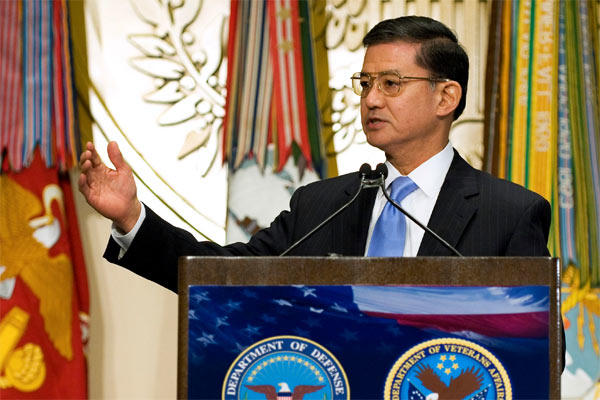The Department of Veteran Affairs would take a major hit if Congress is forced to enact the sequestration cuts despite President Obama's pledge to exempt the department's budget, Veterans Affairs Secretary Eric Shinseki said Thursday.
"If [Defense Secretary Leon Panetta] is concerned about dealing with issues of sequestration, I am concerned as well" regardless of the exemption pledge, Shinseki said at a joint news briefing with Panetta.
Although the VA's budget would be spared, Shinseki said across-the-board cuts on defense would be felt immediately at the VA in programs to ease the transition out of the military, and in efforts to clear up the backlog of VA disability claims.
The VA has processed more than one million claims for the past three years, but the backlog has continued to grow. In September, the average wait to have a claim addressed was eight months, and a total of nearly 900,000 pension and compensation claims were pending.
"There's no question that if sequestration happens there will be an impact on those (servicemembers) coming home," Panetta said of VA benefits for Iraq and Afghanistan troops leaving the military. "It is going to have a serious impact."
Under current law, the White House and Congress face a Jan. 1 deadline for reaching a deficit reduction agreement or legislation written into the Budget Control Act would force the government to absorb a sweeping $1.2 trillion budget cut. The defense budget would sustain a $500 billion cut over the next ten years -- on top of $487 billion in defense cuts already proposed.
Panetta and Shinseki spoke after a meeting at VA headquarters to coordinate on aligning their two vast bureaucracies to ease the often complicated transition from active duty military to veteran status.
"We have brought our two departments closer together than ever before," Shinseki said, but "today veterans still wait too long to get the benefits they deserve."
"This effort cannot be about turf" and protecting the image and authority of either department, Panetta said. "It's got to be about serving our veterans" and "doing everything we can to streamline the disability process. This is in many ways a national security issue."
Panetta said one of the major logjams in the transition process occurred with problems on "claims filed well after the vets leave service. Vets too often fall victim to red tape."
The meeting between Panetta and Shinseki occurred the same week a Congressional subcommittee accused the Defense Department's poor practice of record keeping at the unit level has slowed down the disability claims process.
Shinseki and Panetta said they were optimistic on improvement under an agreement between the departments that made it mandatory for all troops leaving the service to receive a detailed briefing on their eligibility for a wide range of VA benefits.



























